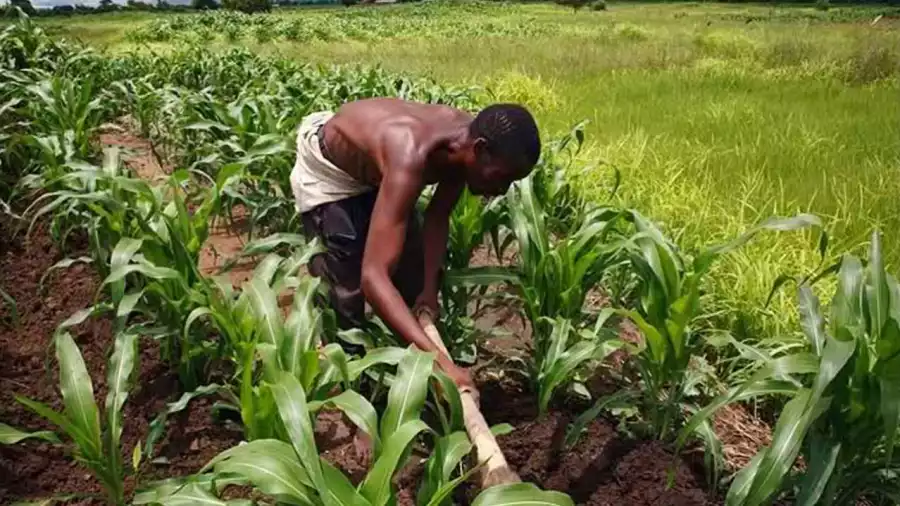Nigerian youths take to agriculture amidst prospects and challenges

Nigerian youths take to agriculture amidst prospects and challenges
The recent decision by the Federal Government to set up a task force on food security appears to be a welcome development in the light of daily astronomical increase in price of food commodities.
But the initiative specifically aimed at curbing the rising cost of food items, appears to be a fire-brigade approach, considering the failure of government to live up to its billings in developing the agricultural sector before now.
Since the present administration assumed office, it has been making endless promises of introducing measures to diversify the economy, by devoting more resources to agriculture, especially in the 2017 budget. One of the major challenges facing farmers in the country, according to stakeholders, is lack of support from government, in terms of funds and information.
Government, through the Bank of Industry (BoI) and Bank of Agriculture (BoA), has constantly announced provision of loan facilities to farmers, but when it comes to accessing the funds, the criteria is always stringent. This has not only discouraged farmers, who toil day and night, with little or nothing to show for their labour, especially with the issue of wastages leaving tons of produce rotten. It has also discouraged most youths, who studied agriculture to seek money-spinning vocations, as alternatives.
But at a time when young Nigerians, especially graduates are running from taking on agriculture as a vocation, some have taken exception to this, adding innovation and modern agricultural practices to the system.
Despite lack of support from government, they have been able to weather the storm and are really making impact. One of them is Ahmed Adedire, a graduate of Industrial Chemistry from University of Ilorin, Kwara State, who presently cultivates an acre of tomato farm in Wasimi, Ewekoro Local Council of Ogun State.
Though the appearance of the Osun State born farmer doesn’t portray him as one, but the fact is that he owns more than the tomato plantation. He is into Integrated Farming-he cultivates cucumber, pepper, rice and also operates poultry and fish farms.
One of the advantages of the system is that through it, farmers can make enormous profit, because the season and climate change always determine their profits. He noted that if the season doesn’t favour pepper, it will favour cucumber, if it doesn’t favour cucumber, it would favour rice.
“The reason for integrated farming is that the output of one, will be the input of others. Like the poultry, the wastes are used for the tomatoes, peppers, cucumber and rice farms. The water from the fish ponds section can be used to wet the plantations, when it is dry season. That gives us the advantage.”
He told The Guardian that he enjoys patronage from market women, who travels from Lagos and neighbouring communities to buy his farm produce, noting that the demand is always higher than supply.
For his tomato farm, he said: “There has never been a time when we harvest and we don’t get market for the produce. The problem we are facing is pricing. If the harvest time falls within the period when there are no too many tomatoes in market, we would get good pricing and good profit but if it is otherwise, we always record losses. That is why we always target a period when the price will be good, a period when tomatoes from the North will not be available.
“The North is good in cultivating tomatoes, we cannot compete with them because we don’t produce en masse. Besides they also enjoy government’s support, which makes them to always beat down their price,” he said.
Adedire, who claimed he has no agric background, but just decided to do something on his own after working in I.T and a real estate company in Lekki, Lagos, said one of the challenges of tomato cultivation is the fact that it is susceptible to diseases because of its moisture, adding that the climate in this part of the country doesn’t really support tomato like the North.
“We always watch out for pests and diseases that can come at anytime.”Mr. Owoeye Olusoji, is a student of Engineering at the Yaba College of Technology, Yaba, Lagos. He is into piggery business and is a member of the Zion Farmers Multipurpose Cooperative Society, Gudugba, located along the Lagos/Abeokuta expressway, Ewekoro Council Area, Ogun State. He has been operating the farm in the last five years
He is one of the pig farmers who stayed back during the outbreak of the dreaded plague-African Swine Fever (ASF), which ravaged pig farms in some parts of the country in 2007. Those who abandoned the business, due to the setback never looked back.
According to him, now, that demand is increasing due to influx of buyers from neighbouring countries of Togo and Benin Republic, pig breeders are struggling to meet up with supply.
He noted that one of their major challenges is the rising cost of feed and other inputs. According to the pig breeder, a ton of feed, which sold for N20, 000 is now N38, 000, while a bag of the feed formerly N800 is now N2,000.
Mr. Dayo Anjorin, is a young cucumber farmer, who has made the fruit readily available to sellers and consumers in Epe area of Lagos State. Relating his experience, which spans over four years, Anjorin said he ventured into cucumber farming, because cucumber has potentials of high yield in a short duration, noting that nonetheless, passion, knowledge, close monitoring and tenacity is essential to achieving great results, just as of any business.
According to the crop farmer, cultivation of the fruit requires lots of soil nutrients to achieve a bountiful harvest.“I always ensure the soil is adequately nourished. However, many farmers lack the technical-know how, hence they harvest below their potential. Presently, we harvest 536 bags from eight plots of land, which is still below our expectation.”
‘Government Is Not Doing Enough To Motivate Youths Into Agriculture Before Now’
?From Alemma-Ozioruva Aliu, Benin City
As the federal government continues to push for interests and investment in agriculture sector of the economy, the government of Godwin Obaseki has earmarked not less than 2,500 hectres of land to be given to people for agricultural purposes. Majority of the target participants are youths that would be gainfully engaged before the end of his first term in office.
Among the youths who before now believed in agriculture and keyed into it is an activist advocating for good governance and youth empowerment, Osaro Iyamu Culture, a graduate of Mathematics from the University of Benin. He calls himself and “agropreneur” and believes there is hope for young farmers in the present administration.
“What we have been seeing in Edo state is individual efforts, government has not really invested in agriculture until the present government came into office. From our own investigations, the governor is willing to invest in agriculture owing to the fact that as we speak, he has already mapped out about 2,500 hectares of land for youths. We hope that they will release these lands for young people. He has also said that he would release soft loans to those who will use those hectares of land and will give them tractors, farming implements and tractors and seedlings. As we speak we are already in touch with the state government through the office of the Secretary to State Government (SSG) who has also assured us that the government will open the door of opportunity for young people to come so that they could be engaged in agriculture.”?
He said he believes in an egalitarian society that is achievable with huge contribution from the agric sector.He, however, called for governments at all levels to create conducive environment for them to thrive
“First, the environment must be attractive for young people to go into agriculture, there must be steady power supply and there must be good road network. Government must endeavour to release loans or grants to farmers so that they can be encouraged to engage in agriculture, because is the life wire of any economy.
“Let us for instance use Niger Delta as a case study, there is a shortfall of food supply in the region, but if you go to the northern part of the country, they are not complaining of hunger. The only problem they are facing there is over-population. The governments there (both state and local governments) are working in partnership to provide land, to till land for farmers, give them soft loans and even encourage financial institutions to support their efforts, but here in South-South, South-East, the governors have not been responsive to our calls.
“Over the time, we called them to fix these problems. Even though, we know it is their responsibility to provide power, it is also the responsibility of the state to at least complement the efforts of financial institutions so that they can release soft loans, provide land, tractors, farm machineries needed by farmers and seedlings to encourage young people to farm.”?
Young Farmer Laments Government Abandonment Of Farm Land In Ikorodu
By Tobi Awodipe
ONE of the Lagos State government’s farm centres is situated at Odogunyan in Ikorodu, few kilometers away from the heart of the town. Popularly called Fish Farm, it was initially created as an Inputs Supply Authority, an arm of the Ministry of Agriculture to serve as a one-stop for agricultural and farming produce, but sadly, the purpose has been lost over the years.
Spanning several acres, the farm boasts of fish ponds, piggeries, poultries, farmlands and so on.Though the place is still very much in use, it is not optimally utilised, as a good portion of the land is not in use and resources, equipment and workers are scarce and far in between.
The Guardian was taken round the farm by one of the second-generation owners and he was full of lamentations. Speaking on the condition of anonymity, one of the owners disclosed that the land originally belonged to the state government but has been leased to several families, one of which he belongs to. His father is the original leaser, but due to his age, he (the son) took over operations some years ago. He revealed that he grows vegetables and runs a poultry, but the state and federal governments are frustrating them daily.
According to him, farming is a lucrative venture once the farmer was passionate about it. He added that most people were usually interested in short term crops that bring quick returns and neglected long term farming and this was responsible for the high cost of food items like yam and rice. He admitted that the dry season was extremely profitable for them as most people did not plant and the few that planted could fix prices as they liked. When asked why most people refused to plant during the dry season, he revealed water was a problem for them, which discouraged many.
Speaking further, he revealed that though there was a government office right on the farm, they did next to nothing for them. “They don’t provide us with seedlings, feed, machines, equipment, chemicals, fertilizer or manure, in fact, we get nothing from them. No provision has ever been made for us; the families dug the boreholes you see here. We are forced to buy seedlings and other things outside and this is more expensive, so we pass the cost onto the consumers. We are not even asking them to give us these things free, they can lease out machines and sell the seedlings, fertilizer and manure at subsidized costs, which is what we need from them. But are the machines even available? They collect all kinds of dues from us and give us nothing in return.”
Revealing that they do not have any issues with security as the place was usually well guarded, he sadly revealed that the government was only paying lip service with the issue of farming, as the most basic framework- food security- was not yet in place.
“By now, we are supposed to be planning ahead and having 3-4 years supply of food stored in silos and preservation should be common place. The government is just going round in circles. We need over 10, 000 tractors presently, other equipment that farmers in other countries take for granted. When are we going to have plane sprayers that spray entire farms at once? We are still using the old methods of farming our fathers used and we are talking about export and food security. There are no means of preservation available, lots of produce waste daily.”
According to him, the farm had no hatchery and they have to travel to Ibadan to get them, where many die due to heat before arriving the farm. He implored the federal and state governments to make better working plans for agriculture and put in place people that knew what they were doing. “The people in charge of these farms don’t know what they’re doing. They are supposed to visit us and help with our issues but I can tell you confidently that I haven’t seen them at all this year and we are in March. Government has no plans for farmers and agriculture and it pains me to see that things are not working the way they should because we have become lazy and over-dependent on importation. No nation can grow when you import everything.”
‘Lack Of Govt Support, Impatience Major impediment To Youths’ Involvement In Farming’
By Daniel Anazia
AKEEM Feyistan is one of the new generation farmers and agro-entrepreneur. A graduate of Agriculture from the Federal University of Agriculture, Abeokuta (FUNAAB), Ogun State and one of the first beneficiaries of Agriculture Youth Empowerment Scheme (Agric-YES).
According to Feyistan, the initiative by Lagos State government is aimed at empowering youths within the state, who have passion for farming, irrespective of their state of origin. He stated there is still wide gap in the agricultural sector of the Nigerian economy, which has large market and can contribute sufficiently to the nation’s gross domestic product (GDP).
With 10 years experience, Feyistan noted that prior to the discovery of oil in Nigeria, unemployment was not a major macroeconomic threat as anyone who was agile had no reason to be idle; food was sufficient and youths were gainfully employed as they engaged in farming. But the oil boom era despite the goodies associated, also came with a plague that resulted in the decline of the agriculture sector share of the nation’s GDP, as everyone abandoned farming for oil.
He said: “While we as a nation busied ourselves relishing the crude oil largesse, we failed to take into consideration the end results and ripple effects of oil on the other sectors of the economy, in particular agriculture. This as you know was the genesis of unemployment in Nigeria.”
On why most Nigerian youths are not taking to farming, the youth activist said the reason is not far-fetched, hinging his answer on impatience.
“A lot of youths don’t have patience, and farming requires patience as it take a lot of process.
“Despite my background as a graduate of Agriculture, I still subject myself to further training, by enrolling for the Lagos State Agriculture Youth Empowerment Scheme (Agric YES). I must say that I’m lucky to be among the pioneers of the scheme. Foreign experts from Israel trained us in various aspects of farming such as fishery, poultry and vegetable.
“After the training, we were made to undergo internship in well-developed farms, before being settled by the Lagos State government in Poka Araga, Epe. Because poultry has the quickest level of return on investment (ROI), is the reason virtually everyone of us are into poultry.”
To him, farming has always been his passion; reason he chosen to be part of the pioneer set of the Lagos Agric YES. Asked how he has been able to manage the challenges associated with poultry farming, the Ogun State native said: “Farming requires daily field experience, stressing that there is a wide gap between theories taught in the classroom and field assessment.’








![Siren (2023) [Hindi]](https://www.memesng.com/r/storage.waploaded.com/images/5b9af584b9aad208a1b1645087762423.jpg?w=50&ulb=true&ssl=1)

















{{comment.anon_name ?? comment.full_name}}
{{timeAgo(comment.date_added)}}
{{comment.body}}
{{subComment.anon_name ?? subComment.full_name}}
{{timeAgo(subComment.date_added)}}
{{subComment.body}}